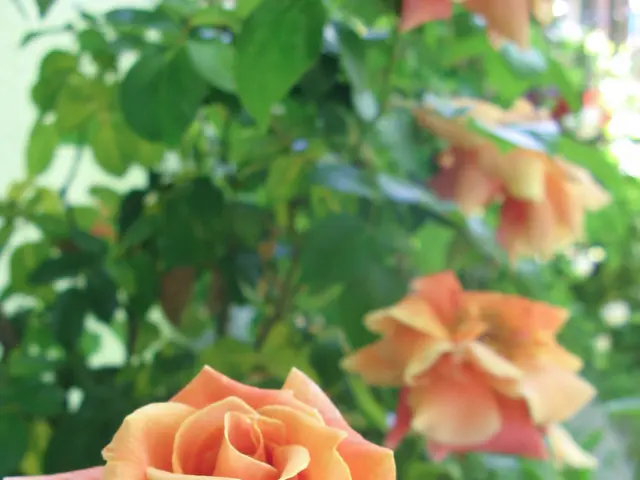Three Efficient Organic Solutions for Aphid Pest Management - Tried and True
In the quest to maintain a healthy garden, discovering aphids can be disheartening. Encountering these minute pests necessitates a swift and effective solution, preferably one that is safe for both the garden and its inhabitants. In this report, we explore three organic methods for aphid control that were tested side by side. Additionally, we share an additional organic method that has proven successful in the battle against aphids in vegetable gardens.
In an experiment conducted by a gardening enthusiast and podcast host, three common organic aphid control methods were put to the test: homemade insecticidal soap, Neem oil, and worm castings. The experiment was carried out using pepper plants started indoors to ensure a controlled environment, free from natural aphid predators that may skew the results.
The first method tested was homemade insecticidal soap, using Dr. Bronner's Peppermint Castile Soap as the base for the solution. Insecticidal soap works by dissolving the outer coating of soft-bodied insects, resulting in dehydration. When applying homemade soap spray, it's crucial to use pure soap without any added ingredients that might harm the plants.
The second method was Neem oil, highly regarded as an organic pest control remedy. Neem oil can be purchased in two forms: 100% cold-pressed Neem Oil, or clarified hydrophobic Neem Oil. The difference lies in their mechanism of action. Cold-pressed Neem Oil, rich in azadirachtin, disrupts the insect's feeding, molting, and egg-laying processes, causing poisoning when ingested. Clarified hydrophobic Neem Oil, on the other hand, works after contact with the insect, similar to insecticidal soap.
Worm castings were another organic aphid control method that scored a surprise recommendation from the Wisconsin Vegetable Gardener Radio Show hosts. The theory is that worm castings contain chitinase, which breaks down the exterior of aphids when taken up by plants. This method was applied to each pot of pepper plants and was watered into the soil.
After completing the experiment, the results indicated that each organic aphid control method was effective in eliminating the pests. The insecticidal soap removed all aphids in just one day, while approximately 80% of aphids were killed on plants treated with Neem oil, and worm castings significantly reduced the aphid population.
It's worth noting that even without any intervention, the control group had an increase in aphid population over time. After the conclusion of the experiment, the control plants were treated with worm castings, which eliminated the aphids in a few days. This experiment also found that about a week after the conclusion, the treated pepper plants showed no signs of aphids when transferred to the main garden.
In conclusion, while all three organic aphid control methods proved effective, it's essential to consider letting nature take its course whenever possible. Aphids are often dubbed as the "salad bar of the insect world," attracting beneficial insects that help control both aphids and other pests. Organic pest control sprays, such as insecticidal soap and Neem oil, can inadvertently harm these helpful insects, making it advisable to use them sparingly.
In understanding the role of beneficial insects in the garden and implementing methods to attract them, one can create a harmonious balance between controlling pests and cultivating a thriving garden ecosystem. For more insights on organic gardening and avoiding common mistakes, check out the links provided.
In addition to the tested methods, gardeners can also benefit from various resources and lifestyle tips. The home-and-garden blog, "Sustainable Living," offers garden printables for designing organic garden beds and tracking pest control methods.
Subscribing to the "Garden Resources Podcast" provides valuable information on improving garden soil health, organic pest control practices, and practical tips for avoiding common gardening mistakes.
In line with maintaining a balanced garden ecosystem, incorporating natural habitats and plants that attract beneficial insects can help control pests in a sustainable manner. Popular home-and-garden magazines such as "Mother Earth Living" and "Organic Gardening" offer articles on attracting these insects, enhancing their presence in the garden, and nurturing the overall well-being of the garden population.
Embracing organic gardening and responsible pest control not only enhances the beauty and productivity of a garden but also contributes to a lifestyle that promotes sustainable living and eco-friendly practices.








